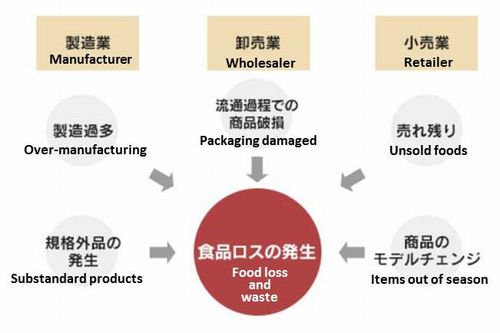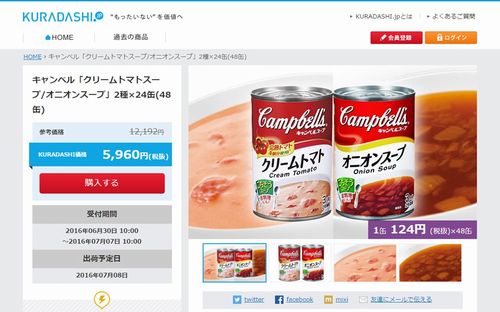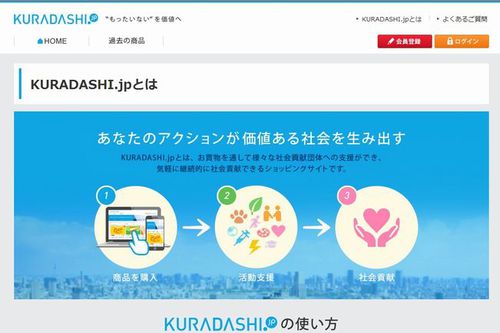July 7, 2016
Initiative by Kuradashi.jp Cuts Food Waste in Japan and Saves Money
Keywords: Food Newsletter Reduce / Reuse / Recycle
JFS Newsletter No.166 (June 2016)
An estimated 6.42 million tons of food loss and waste is generated annually in Japan. This is about twice the 3.08 million tons of food provided by the United Nations World Food Programme as humanitarian aid in 2014. Yes, this huge amount of food is discarded every year in Japan. This month's JFS newsletter reports on Kuradashi.jp, an initiative that uses online shopping to reduce food loss while also promoting solutions to other social issues.
Issues of Food Loss and Waste in Japan
Half of the food loss and waste in Japan is generated by households. To reduce that amount, individuals need to become more conscious of the waste and modify their lifestyles. The other half of the waste is from the business sector (food manufacture, wholesale, and retail industries).

Source: Ministry of Agriculture, Forestry and Fisheries (Dec. 2015)
Translation by JFS
For typical food products on the market, the protection of brand image and market position is usually a high priority, so businesses tend to take food items off the shelf, for example, if time is running out before the "best-before" date, packaging has been damaged, or the item is going out of season. A large amount of food that is actually still edible is discarded because of such practices.
Kuradashi.jp Reduces Food Loss, Saves Money
To address this, Tatsuya Sekito, the CEO of the Japanese consulting company Glaucks Co., launched Kuradashi.jp. In an interview with JFS , he said, "When looking at the global food situation, it is obvious that food losses should not be happening."

Copyright Glaucks Co.
All Rights Reserved.
In 2020, the Olympics will be held in Tokyo. After the success of the London Olympics on the theme of sustainability, Tokyo will also be attracting global attention for its efforts in managing the Tokyo Olympics to create systems for a more sustainable society. Sekito is passionate about what he does, saying, "We can't miss this opportunity. We want to use the power of business to reduce food waste and make progress toward improvements and solutions for this issue."
His attention was originally drawn to the food losses generated in business processes. He imagined a system in which food products that could no longer be sold through the regular retail market could instead go into another distribution channel. If that could be done, wasteful (in Japanese, "mottainai") practices could be reduced and food that is still edible but would otherwise be discarded could actually retain some value. But what would that system look like? Based on his work experience in global production management and logistics at a trading company, the idea Sekito eventually settled on was Kuradashi.jp.
Kuradashi.jp is an online shopping website, launched February 27, 2015. It sells products supplied by cooperating manufacturers that endorse its objectives. They provide their products at special prices, so most of the products are priced at half the regular price or lower. After free membership registration, anybody can visit the website and make a purchase. The greater the sales, the greater will be the reduction in food waste, because these are products that would otherwise be discarded.
Some readers may notice that this system has three beneficiaries -- the vendor, the consumer, and society. This is the concept of "sampo-yoshi" (meaning beneficial in three ways), which has been introduced previously in JFS newsletter articles.
Vendors enjoy the benefit of reduced disposal costs, because the amount of products disposed decreases. They can also cultivate potential customers who purchase their products by attracting them with their inexpensive, easy-to-try products. Furthermore, vendors can attract more customers through social contributions, and this can boost the corporate image.
For consumers, the biggest benefit is access to less-expensive products. Also, the act of purchasing could be considered a social contribution, so the level of customer satisfaction is expected to rise.
For society, reduced food loss and waste is the most direct benefit. In addition, this system is designed to help address social issues, as discussed below, and this is also expected to bring about positive benefits for society.
Kuradashi's Approach to Mobilize Shoppers toward Social Issues
In Japan, six ministries and agencies cooperate with the private sector to jointly promote the "No-Foodloss Project," a food loss reduction campaign. The government members of the project are the Consumer Affairs Agency; Cabinet Office; Ministry of Education, Culture, Sports, Science and Technology; Ministry of Agriculture, Forestry and Fisheries; Ministry of Economy, Trade and Industry; and Ministry of the Environment. They all regard food loss and waste as a crucial problem for the nation, and the project was started by when they decided to make it a priority to reduce the waste.
The "No-Foodloss Project" link from the Kuradashi.jp website is one example of how it is attempting to raise awareness of broader issues.
Sekito says that not many people realize that the food waste issue is serious enough to need a national campaign. He thinks that many people are unaware of issues in society like food loss, and even if they happen to notice the problem, may not know what to do to help solve it.
"We are often told to do something good to solve social issues, but many of us can't even make a step toward solutions, as we are busy struggling with our everyday lives and jobs. As a breakthrough, we would like to present people with the first step they can take by finding our concept embedded in our service -- their shopping behavior at discount prices can contribute to reducing the amount of food discarded." Sekito's words convey his passion to change people's behavior and contribute to society.

KURADASHI.jp website.
"There are many other social issues, and with each of them there are people making efforts to bring about solutions. I just want people to experience support in giving, making use of the opportunity of shopping. Once some people think any activity is worthwhile, they can shift to direct support. I think this is a good way to start with steps to change gradually for people and society."
To explain how Kuradashi.jp's shopping website works, let's take an example of cans of tomato cream soup and onion soup (two types of soup x 24 cans = 48 cans in a set).
The regular catalog price of the soup is 12,192 yen (about U.S.$109). Kuradashi.jp offers the same items at about half the price, or 5,960 yen ($53), plus 324 yen ($3) for shipping. Most of the products on the website are listed at half the regular price or less.
The purchase price of a product includes funds that goes to a group engaged in social contribution activities. The amount of the donation is pre-set for each product.
On the top page of the kuradashi.jp website, a slideshow explains the concept that part of its revenue goes to social contributions. Even people who are simply visiting the website to find cheaper products can be made more aware of social contributions if they are attracted to return to the site.

KURADASHI.jp website.
The lower part of the webpage shows a description of each product. It shows icons for six categories of recipient groups, depending on their activities: overseas aid, environmental conservation, disaster relief, medical assistance, animal rights, and social welfare. This section also serves to raise awareness about social contributions.
Jumping to the webpage of each product, customers can find further details. In the example of tomato cream soup and onion soup, 180 yen (about $1.52) will be sent to a recipient organization as a result of a purchase. The amount of donation and the designated recipient group are indicated below the total price, so customers can see this information while they shop.
Kuradashi.jp allows customers to change their desired recipient groups. The groups' activity reports are updated every three months and direct links are provided to their websites.
The members-only page provides the registered member's accumulated amount of donation and "Kizuna points" (kizuna means bond or connection in Japanese). This is Kuradashi.jp's own point system to indicate the value of members' social contributions, which increase along with their purchases.
The Kuradashi.jp website features various "hooks" like these to raise awareness of social contributions. Even if the primary reason to start shopping was to buy cheaper food products, Kuradashi.jp expects the user to gradually become more aware of social contributions.
Expanding Activities and Networks
Kuradashi.jp also engages with the "Reuse! Japan Project" initiated by Yahoo Japan Corp. This project offers information on activities for reusing things. Involving individuals, businesses, and governments, the project aims to realize a recycling-oriented society for things and resources, by encouraging people to reuse things as a lifestyle habit.
This project handles products from Kuradashi.jp through the online platform of Yahoo Auction, one of Japan's largest online auction services. When shopping via Yahoo Auction, buyers donate 50 yen (about $0.44) per product to a foundation launched by Yahoo Japan Corp., and the funds are utilized for people in need in disaster-affected areas and for disaster relief activities.
A new project was launched in partnership with a non-profit group when Kuradashi.jp added it as a new donation recipient on May 13, 2016, to help a project initiated by Food Bank Yamanashi to support children.
Through its "Food Safety Net" project it distributes donated food to households in need. This new project for children will concentrate on delivering food to these households every week in August during the summer holidays, when schools stop offering lunch to students.
Kuradashi.jp's activities continue to grow, so JFS will keep an eye on future developments, and give updates for our readers, including the collaboration with Yahoo! Japan and Food Bank Yamanashi.
Written by Nobuhiro Tanabe
Related
"JFS Newsletter"
- 'Good Companies in Japan' (Article No.4): 'Eightfold Satisfaction' Management for Everyone's Happiness
- "Nai-Mono-Wa-Nai": Ama Town's Concept of Sufficiency and Message to the World
- 'Yumekaze' Wind Turbine Project Connects Metro Consumers and Regional Producers: Seikatsu Club Consumers' Co-operative
- Shaping Japan's Energy toward 2050 Participating in the Round Table for Studying Energy Situations
- 'Good Companies in Japan' (Article No.3): Seeking Ways to Develop Societal Contribution along with Core Businesses



